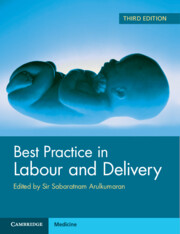Book contents
- Best Practice in Labour and Delivery
- Reviews
- Best Practice in Labour and Delivery
- Copyright page
- Contents
- Contributors
- Preface to the Third Edition
- Acknowledgements
- Chapter 1 Pelvic and Fetal Cranial Anatomy and the Stages and Mechanism of Labour
- Chapter 2 The First Stage of Labour
- Chapter 3 Analgesia and Anaesthesia in Labour and Delivery
- Chapter 4 Intrapartum Fetal Monitoring
- Chapter 5 Uterine Contractions
- Chapter 6 Identification and Management of Presumed Intrapartum Fetal Distress
- Chapter 7 Prolonged Second Stage of Labour Including Difficult Decision-Making on Assisted Vaginal Birth and Caesarean Birth
- Chapter 8 Instrumental Vaginal Deliveries
- Chapter 9 Vaginal Breech Deliveries and External Cephalic Version
- Chapter 10 The Evidence-Based Caesarean Delivery Technique
- Chapter 11 Shoulder Dystocia
- Chapter 12 Umbilical Cord Prolapse
- Chapter 13 Twin Delivery
- Chapter 14 Antepartum Haemorrhage
- Chapter 15 Management of the Third Stage of Labour
- Chapter 16 Postpartum Haemorrhage
- Chapter 17 Management of Placenta Accreta Spectrum
- Chapter 18 Acute Illness and Maternal Collapse
- Chapter 19 Episiotomy and Obstetric Perineal Trauma
- Chapter 20 Induction of Labour
- Chapter 21 Preterm Pre-labour Rupture of Membranes
- Chapter 22 Preterm Birth
- Chapter 23 Labour in Women with Medical Disorders
- Chapter 24 Management of Women with Previous Caesarean Section
- Chapter 25 Hypertensive Disorders in Labour and Delivery
- Chapter 26 Rupture of the Uterus
- Chapter 27 Neonatal Resuscitation and the Management of Immediate Neonatal Problems
- Chapter 28 The Immediate Puerperium
- Chapter 29 Triage and Prioritisation on Labour Wards
- Chapter 30 Maternity Training in the Twenty-First Century
- Chapter 31 Risk Management in Intrapartum Care
- Chapter 32 Cerebral Palsy Arising from Events in Labour
- Chapter 33 Non-technical Skills to Improve Obstetric Practice
- Index
- References
Chapter 18 - Acute Illness and Maternal Collapse
Published online by Cambridge University Press: 16 October 2025
- Best Practice in Labour and Delivery
- Reviews
- Best Practice in Labour and Delivery
- Copyright page
- Contents
- Contributors
- Preface to the Third Edition
- Acknowledgements
- Chapter 1 Pelvic and Fetal Cranial Anatomy and the Stages and Mechanism of Labour
- Chapter 2 The First Stage of Labour
- Chapter 3 Analgesia and Anaesthesia in Labour and Delivery
- Chapter 4 Intrapartum Fetal Monitoring
- Chapter 5 Uterine Contractions
- Chapter 6 Identification and Management of Presumed Intrapartum Fetal Distress
- Chapter 7 Prolonged Second Stage of Labour Including Difficult Decision-Making on Assisted Vaginal Birth and Caesarean Birth
- Chapter 8 Instrumental Vaginal Deliveries
- Chapter 9 Vaginal Breech Deliveries and External Cephalic Version
- Chapter 10 The Evidence-Based Caesarean Delivery Technique
- Chapter 11 Shoulder Dystocia
- Chapter 12 Umbilical Cord Prolapse
- Chapter 13 Twin Delivery
- Chapter 14 Antepartum Haemorrhage
- Chapter 15 Management of the Third Stage of Labour
- Chapter 16 Postpartum Haemorrhage
- Chapter 17 Management of Placenta Accreta Spectrum
- Chapter 18 Acute Illness and Maternal Collapse
- Chapter 19 Episiotomy and Obstetric Perineal Trauma
- Chapter 20 Induction of Labour
- Chapter 21 Preterm Pre-labour Rupture of Membranes
- Chapter 22 Preterm Birth
- Chapter 23 Labour in Women with Medical Disorders
- Chapter 24 Management of Women with Previous Caesarean Section
- Chapter 25 Hypertensive Disorders in Labour and Delivery
- Chapter 26 Rupture of the Uterus
- Chapter 27 Neonatal Resuscitation and the Management of Immediate Neonatal Problems
- Chapter 28 The Immediate Puerperium
- Chapter 29 Triage and Prioritisation on Labour Wards
- Chapter 30 Maternity Training in the Twenty-First Century
- Chapter 31 Risk Management in Intrapartum Care
- Chapter 32 Cerebral Palsy Arising from Events in Labour
- Chapter 33 Non-technical Skills to Improve Obstetric Practice
- Index
- References
Summary
Acute Illness and Maternal Collapse is an important chapter for all healthcare professionals involved in maternity services. This chapter reviews physiological changes of pregnancy and applies these principles to recognition of maternal illness. Specific conditions that contribute to poor maternal outcomes are outlined together with a systematic approach to assessment and management of an unwell mother, including management of maternal/obstetric cardiac arrest. This chapter should enable clinicians to develop well-rounded and patient-centred skills in the recognition, assessment and management of an unwell mother.
Keywords
Information
- Type
- Chapter
- Information
- Best Practice in Labour and Delivery , pp. 215 - 229Publisher: Cambridge University PressPrint publication year: 2025
